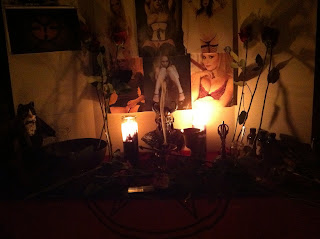“Magickal terms are rather limited in our culture.”
-- Peter J. Carroll, General Considerations on the Philosphy and Practice of Magick
I’ve said before that I enjoy chaos magick thinking not because of the deification of randomness, or the simplistic systems used. I enjoy chaos magick because it forces the magus to look at their workings as experiments. Due to the personal nature of magick, nothing can be taken for granted. While we respect the work of those who came before us, we see the need for continued evaluation of their effectiveness.
To do this, chaotes seek to create a vocabulary of magick. Without a consistent means of describing our experiences, we cannot share our results. To exacerbate things, most magickal terms work only within the specific belief system that created them. Also, magickal terms are often shared between belief systems, sometimes with contradictory meanings.
This last weekend I spent more time than usual discussing magick. I attended the Indianapolis Pagan Pride festival, and the inaugural meeting of my new group, Collegium Arcanum. As usual I enjoyed the people I met at these events. I learned a lot about magick and the people who practice it. I am ashamed to admit, however, that I times various cliques within the gatherings fell to talking about the “others”.
The “others” being those who do not believe the same way you do, or are perceived to have a greater or lesser degree of dedication to their magickal practices. Sometimes the “others” are simply those who align themselves with different people within the group. I admit I participated in some of this.
In fact, I participate in it too often. My anger demon often lashes out at things I don’t understand. I’ve often said, “I don’t understand the appeal of Thelema, but I love Thelemites.” I don’t have much appreciation for the works of Aleistar Crowley, but it seems I enjoy the company of those who do. This makes things difficult for me, as I am argumentative by nature. At times it manifests as belittling some one's beliefs. A habit I seek to correct in my behaviour.
Perhaps, in essence, many of my disagreements with other occultists come from a lack of a shared language. When someone says “angel” I automatically think, “Judeo-Christian”. I often need to stop my thought process to absorb the possibility they may be talking about something entirely different. When someone says “God” I automatically think patriarchal and monotheistic. Once again, this does not accurately describe the beliefs of the people using the word.
Now more that ever, as magickal traditions become more eclectic and diverse, we need a shared magickal language. Some will be naturally resistant to this, as they may believe it removes their tradition from the center of “rightness”. Yet almost every occultist I know subscribes to the belief that everyone has a right to their own path, which may be the correct one for them. If you truly subscribe to this, then you must be prepared to call your “angel” an “entity”. You may want to consider that your notion of “God” may be closer to “guiding principle”.
In the early years of Christianity, many of the old pagan gods were branded as demons. We become the same kind of spiritual bullies if we refuse to entertain the notion that one person’s demon can be another person’s angel.
Where do we begin? I’m not sure. I would love to hear your thoughts. We can, however, remember to describe our own works in the most general terms possible, so that others can best interpret them.





